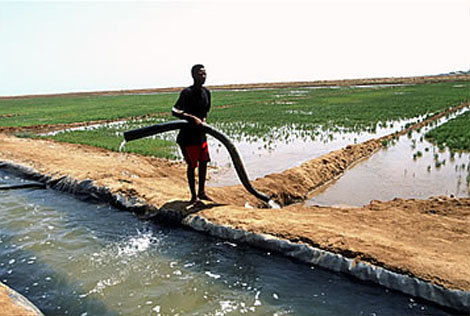A new report is calling on the African governments to consider expanding irrigation projects since the continent has the potential to boost agricultural productivity.

The study that was done by the Malabo Montpellier Panel finds potential to expand irrigation across 47 million hectares in Africa to improve livelihoods and economic growth.
“Helping more farmers to access and use irrigation systems holds the key to African countries meeting hunger and food security targets, a new report sets out,” the report, launched on Monday, January 14, 2018, revealed.
Titled: “Water-wise: Smart irrigation strategies for Africa”, the report highlights success stories from six African countries where greater levels of irrigation have led to better and longer harvests, higher incomes and better prospects for farmers.
The report is being released at a time that food production in Africa still relies almost exclusively on rain-fed agriculture, leaving farmers and rural communities vulnerable to increasingly erratic rainfall patterns and extreme climate conditions.
“There is vast potential to scale up irrigation, particularly across sub-Saharan Africa (SSA), to increase crop yields and improve resilience to climate shocks, the report finds,” the report noted.
The study, which was conducted in Ethiopia, Kenya, Mali, Morocco, Niger and South Africa, revealed that yields from irrigated crops can be double or more of comparable rain-fed yields on the continent.
It noted that the economic benefits of expanding areas under irrigation are estimated to be double the costs under climate change.
“This report shows the great potential for irrigation to improve agricultural output across Africa,” Dr. Saulos Klaus Chilima, Vice President of Malawi and co-chair of the Malabo Montpellier Forum, said while unveiling the report in Rabat, Morocco.
Chilima observed that from the study, there are lessons to learn from the countries within the continent to help expand arable land through irrigation.
He revealed that Malawi has already seen incomes rise by up to 65 percent through the expanded areas.
The study found several common features among the countries that have made significant progress in expanding irrigation and called on other countries to embrace irrigation to improve food security and nutrition targets under the African Union’s Agenda 2063 and the Malabo Declaration.
It said that irrigated agriculture can enable farmers extend the growing season, increase productivity and incomes, and improve their livelihoods.
In Niger, up to 20 per cent of agricultural Gross Domestic Product (GDP) is generated through irrigated agriculture.
The report however calls on governments to carefully plan the expansion to avoid adverse impacts on the environment and human health.
Dr. Ousmane Badiane, Africa Director for the International Food Policy Research Institute (IFPRI), said that the expansion calls for dedicated, effective government institutions and significant increase in public investment for irrigation programs in the continent.
“Partnership with the private sector and farming communities and improved regulations for safe and sustainable use of water, are other driving factors,” he added.
Professor Joachim von Braun, Director of the Centre for Development Research at Bonn University in Germany, noted that for success to be realized there is need for robust technology that saves water and energy and can be sustained locally.
He said that the governments must also engage local organizations with women and men farmers in the lead of their irrigation.
“We must elevate irrigation to a top policy priority to bring it to scale as a key ingredient to ensure the continent’s food security in the face of more extreme weather conditions,” said Dr. Agnes Kalibata, President of Alliance of Green Revolution in Africa (AGRA).
Dr. Kalibata called for emphasis on farmer-led irrigation to scale household level resilience to shocks through new models.
She challenged governments to design irrigation projects to fit local environments and meet the needs of smallholder farmers.
In Africa, only six per cent of cultivated land is currently irrigated, compared to 14 per cent in Latin America and 37 per cent in Asia.
By Duncan Mboyah
